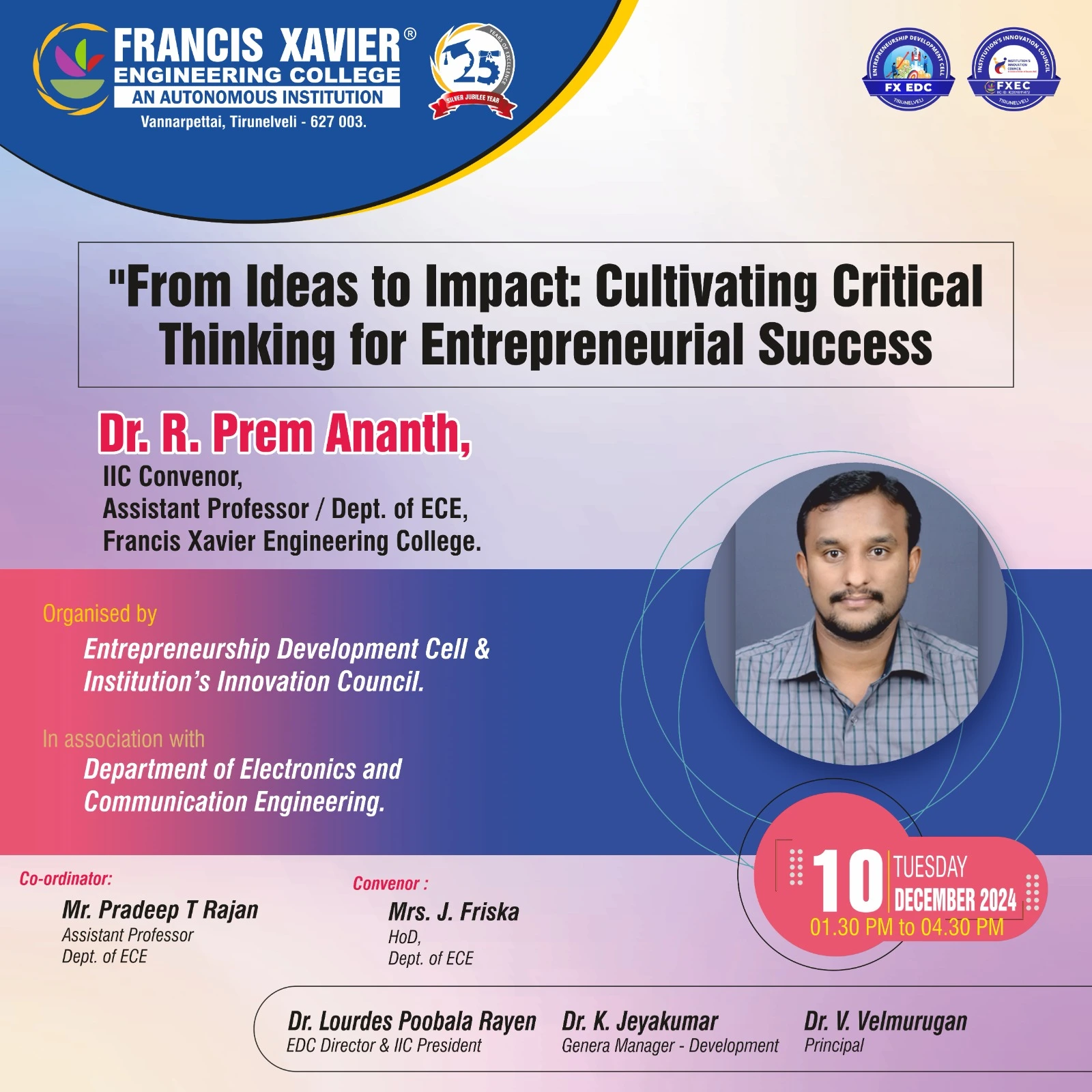
On 10.12.2024 a session was organized on the title “From Ideas to Impact: Cultivating Critical Thinking for Entrepreneurial Success” by the Entrepreneurship Development Cell and IIC in association with the Electronics and Communication Engineering department. The session was handled by Dr. R Prem Ananth, IIC Convener, IIC Innovation Ambassador for "Design thinking & Innovations", Assistant professor, Francis Xavier Engineering College. 57 students and 2 faculties participated in the program. This event was coordinated by Mr.Pradeep T Rajan, Assistant Professor, Department of ECE, Francis Xavier Engineering College.
The speaker commenced the session by emphasizing the importance of critical thinking in the entrepreneurial journey. He highlighted how this cognitive skill forms the bedrock of innovation and creativity, enabling individuals to identify opportunities and devise effective solutions to real-world problems. Stressing the necessity of approaching challenges from multiple perspectives, he underscored the transformative potential of critical thinking in reimagining conventional practices and driving impactful changes. One of the key highlights of the session was the case study of Airbnb. he explained how the founders of Airbnb leveraged critical thinking to identify a unique business opportunity within the hospitality industry. By rethinking the concept of accommodation and capitalizing on unused spaces, the founders disrupted the traditional hotel model, creating a platform that has since revolutionized global travel. This example served as a compelling illustration of how unconventional thinking can uncover hidden potential and reshape industries, inspiring students to think innovatively.
The discussion then delved into the concept of frugal innovation, exemplified by the Mahindra XUV 700 and XUV 300. He highlighted how these vehicles were developed with a focus on delivering maximum value while utilizing limited resources. This approach, he explained, is rooted in critical thinking, which enables designers and engineers to create cost-effective yet high-quality solutions that meet customer demands. By citing these examples, he underscored the practicality of applying critical thinking to achieve efficiency and impact in resource-constrained settings. Moving on to incremental innovation, he explored the evolution of telecommunications technology from 1G to 5G. He explained how each generational leap in technology built upon its predecessor, gradually introducing transformative advancements in connectivity, speed, and functionality. This step-by-step approach to innovation, he noted, is a testament to the importance of persistence and critical thinking in achieving sustained progress. By drawing attention to the incremental nature of these innovations, he encouraged students to recognize the value of gradual improvements in driving long-term success.
Another significant example discussed during the session was the innovation of LED lamps as a replacement for fluorescent lamps. He described how this disruptive innovation not only improved energy efficiency but also paved the way for sustainable solutions in the lighting industry. He highlighted how critical thinking enabled engineers to identify the limitations of existing technologies and develop superior alternatives that addressed both environmental and economic concerns. This example demonstrated the power of disruptive thinking in creating solutions that challenge the status quo and deliver significant benefits. Throughout the session, Dr. Prem Ananth emphasized the direct link between critical thinking and entrepreneurship. He encouraged participants to cultivate a mindset that prioritizes questioning assumptions, exploring diverse perspectives, and approaching problems with creativity and resourcefulness. By fostering these qualities, students can better identify opportunities, develop innovative solutions, and ultimately make a meaningful impact in their chosen fields.

